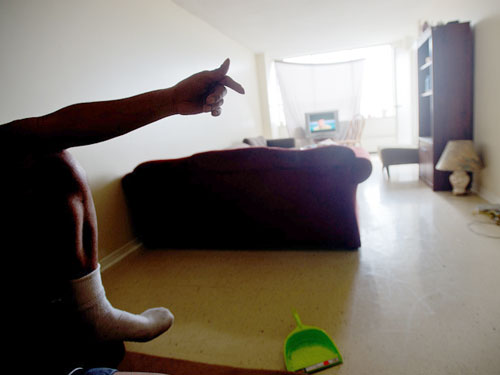Somali pressure groups respond
Not everyone cheered the police for successfully taking 42 guns
and 175,000 grams of various illegal drugs off the streets of Toronto.
Social activist groups
Somali pressure groups quickly jumped in front of the hungry cameras.
The mother and grandmother of Siyadin Abdi, who was arrested for being
a participating in a criminal organization, trafficking in firearms and
ammunition, and unauthorized possession of a firearm a criminal gang,
held a press conference in their apartment in 340 Dixon Road to
complain that the Toronto police used unnecessary force and were
culturally insensitive during their early morning raid.
There was a meeting for the Somiali residents held in the 320 Dixon
Road party room. Hers was one of several stories shared on Tuesday at
the conference held by the African Canadian Legal Clinic to condemn
last weeks raids as part of Project Traveller and allege police
officers used excessive force and were culturally insensitive.

After the raids, many Somali community members felt victimized and
traumatized as a result of the reckless manner in which the officers
forcibly entered their homes,” community activist Mahad Yusuf told
reporters Tuesday morning. "The community members are angry about the
destruction of their property, the disrespectful comments made by
police and the police brutality."
Speaking with reporters Thursday, Yusuf said police treated area
residents like “criminals” and used “excessive force” during the raids.
Police response
Police spokesperson Mark Pugash said the raids were far less disruptive
than the violence the community has experienced.
“You’re asking officers, who have intelligence that there could well be
weapons behind the doors by people prepared to use them, who have to
get in those units under difficult circumstances,” he said. “There is
no doubt the community is safer today then it was prior to the
execution of the search warrants.”
Project Clean Slate
Police launched “Project Clean Slate,” which involves
establishing a police presence in the neighbourhood, as well as
community and youth outreach initiatives to make sure another gang does
not establish itself in the neighbourhood.
“We’re not doing this alone … we’re doing this with the community,”
Sloly said, adding more arrests are likely to come. “The vast majority
of the people in that community are good, hard-working people.”
Supt. Ron Taverner said officers in the community will partner with a
Somali liaison unit to work with the Somali community in the area.
“These officers will work to create meaningful dialogue, building on
trust
and the relationships that they’ve build within the Somali
community to date,” he said.
A police command post will remain in the neighbourhood for at least
another 72 hours.
Change in
media coverage
There was a big change in media coverage about crime in this
neighbourhood. Up until June, the media would state:
• an apartment building in Rexdale
• an apartment building on Dixon Road.
• Units 1701 and 1703 in a Dixon Road apartment complex.
However, after the shooting, reporters would not only state the exact
address, they were interviewing residents inside their apartments.

A National Post photograph of
Unit #1703
After the raid and the reaction of the somali community, the media
started calling the Dixon-Kipling area "Dixon City" and "Little
Mogdashu".
top contents
chapter previous next

